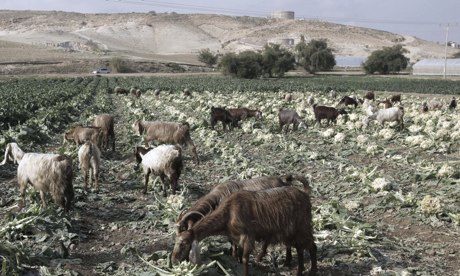Israeli ministers back Jordan Valley annexation ahead of John Kerry visit
 Thursday, January 2, 2014 at 12:12AM
Thursday, January 2, 2014 at 12:12AM http://www.theguardian.com/world/2013/dec/31/israeli-government-jordan-valley-john-kerry-visit
Palestinian leaders condemn support for bill as US secretary of state heads to region for latest attempt to unblock peace talks
by Harriet Sherwood 31 December 2013 The Guardian

Rightwing Israeli government ministers have stepped up their opposition to a peace deal with the Palestinians before US secretary of state John Kerry's visit to the region this week by backing a parliamentary bill to annex a strategically significant swath of the West Bank.
The proposal to extend Israeli sovereignty to the Jordan Valley – a de facto annexation – was passed by a ministerial committee with the support of eight members of the government. Although the bill is unlikely to become law, it is symbolic of the deep opposition at the heart of the Israeli government to any peace agreement resulting in a Palestinian state in the West Bank, East Jerusalem and Gaza.
Kerry is due to arrive on Thursday for meetings with the Israeli prime minister, Binyamin Netanyahu, and the Palestinian president, Mahmoud Abbas, in his 10th visit to the region since March. The US secretary of state is expected to present a framework for further negotiations in an attempt to unblock the talks, in which little progress has been made over the past five months.
The framework is expected to cover broad principles on the issues of borders, security, refugees, Jerusalem as the capital of both states, and recognition by the Palestinians of the state of Israel. The deadline for completion of the talks is April, but there is widespread scepticism that a deal will be reached.
The impending arrival of the US secretary of state was marked with Hebrew graffiti in a Palestinian village saying "Regards to John Kerry" and "Blood will be spilled in Judea and Samaria" (the biblical names for what is now the West Bank). Police said they suspected extremist Jewish settlers were responsible for the graffiti as well as the torching of villagers' cars.
Settlers also plan an inauguration ceremony, to be attended by the minister of the interior, Gideon Sa'ar, to mark the construction of new homes in a Jordan Valley settlement on the day of Kerry's arrival. The aim is to stress "the integral Israeli connection to the Jordan Valley, which is considered as a mainstream red line in any future negotiations", they said. All settlements in the West Bank and East Jerusalem are illegal under international law.
The Jordan Valley has been pushed by Israel as a key factor in any agreement. The area, which is close to the border with Jordan, is home to dozens of Jewish settlements and huge Israeli agribusinesses, which export much of their produce.
Israel wants to maintain a military presence in the valley indefinitely to act as a buffer against hostile Arab states or non-state militant organisations. According to Dore Gold, a former Israeli ambassador to the UN, the area is "the frontline of Israel's defence".
On Sunday Israeli ministers voted eight to three for annexation. The bill's sponsor, Miri Regev, said the committee's approval was "a clear statement by the government that the towns in the Jordan Valley are a strategic and security asset of the state of Israel that must stay in our hands".
Chief negotiator Saeb Erekat told the Voice of Palestine radio the move "finishes all that is called the peace process". In a statement, he warned that Palestinian officials were reconsidering their commitment to refrain from joining international bodies such as the international criminal court while talks continued.
"Denying Palestine its only international border with Jordan is a clear step towards a permanent apartheid regime consisting of one state with two segregated systems," the statement said.
Kerry's visit follows Israel's release of 26 long-term Palestinian prisoners in the early hours of Tuesday as part of a pre-talks agreement to free 104 men in four stages during the course of the talks. The third tranche of releases saw 18 prisoners freed to the West Bank, three to Gaza and five to East Jerusalem. They had served between 19 and 28 years in jail, mostly for murder.
In Ramallah, Abbas greeted the freed men with the promise that "there will be no final agreement without the release of all prisoners".
The Israeli human rights organisation B'Tselem said in its end of year review that 36 Palestinians had been killed by Israeli security forces in 2013. Twenty-seven were killed in the West Bank, a five-year high, and nine in Gaza. Three Israeli civilians were killed by Palestinians in 2013, it said.
 APJP |
APJP |  Post a Comment |
Post a Comment | 

Reader Comments